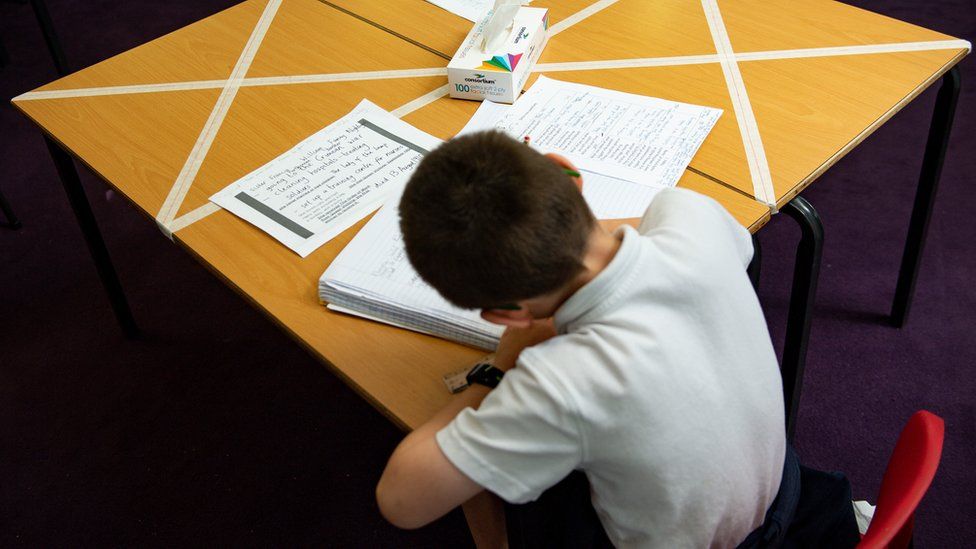Covid: Catch-up narrative putting 'huge pressure' on children, psychologists say
- Published

The idea that children must "catch up" with learning lost due to the pandemic is heaping "huge" pressure on them, educational psychologists have warned.
Many pupils have missed out on months of face-to-face teaching, and the PM has appointed a catch-up tsar to lead educational recovery in England.
But the British Psychological Society says children's wellbeing, rather than their learning, should be the focus.
The government said it was funding support for pupils' mental wellbeing.
Prime Minister Boris Johnson will set out his "road map" for lifting lockdown restrictions in England later, with all schools expected to reopen on 8 March.
Some younger children will also return to classrooms in Northern Ireland that week, while Wales and Scotland begin a phased return to schools for some pupils from Monday.
Dr Dan O'Hare, co-chair of the BPS division of educational and child psychology, said it was "absolutely understandable" that parents are concerned children have "been missing out on many aspects of their formal education" - but warned against setting expectations too high.
"The notion that children need to catch up or are 'behind' at school due to the pandemic reinforces the idea that children have 'one shot' at their education and puts them under even more pressure to perform academically after what has been a challenging and unprecedented time for everyone," he told the PA News agency.
"Formal lessons must of course continue, but we shouldn't simply expect children and young people to pick up where they've left off and 'catch up' immediately on any gaps in their learning.
"This places huge and unnecessary pressure on children who have been through an extraordinary and potentially stressful time."
Mr Johnson has previously said that "no child will be left behind" because of the pandemic, and has appointed Sir Kevan Collins as education recovery commissioner to oversee how England's schools can catch up from the disruption caused by the pandemic.
Sir Kevan said extra hours of academic learning - plus sport, music and drama - will be needed to help pupils make up ground.
But head teachers' leaders have warned against "misconceived and unhelpful" suggestions about longer schools days and shorter holidays to help pupils catch-up.
The BPS said children should be supported through socialisation and play, and echoed head teachers' calls for a quality-over-quantity approach to learning, saying there should be a phased return to regular schooling.
Dr O'Hare said it was "unrealistic" to expect children who have lived through such disruption to settle into formal learning.
"Whatever a child or young person's circumstances, we can't assume that the right thing to support their recovery and wellbeing is for them to be in lessons for longer each day," he added.
A Department for Education spokesman said: "We know the pandemic has had an impact on many children and young people's mental health and wellbeing, and that's why we are working to fully reopen schools as soon as possible.
"Our guidance has emphasised the importance of pastoral support both in school and as part of remote provision and included advice and support on mental wellbeing.
"The £650m catch-up premium funding can be used for pastoral support activity where needed to support reengagement and recovery.
"To support children returning to schools, our £8m Wellbeing for Education Return programme funds local expert support for education staff to respond to emotional and mental health pressures some children and young people may be facing."
- LOOK-UP TOOL: How many cases in your area?
- YOUR QUESTIONS: We answer your queries
- GLOBAL SPREAD: How many worldwide cases are there?
- THE R NUMBER: What it means and why it matters
- TEST AND TRACE: How does it work?
Related Topics
- Published19 February 2021
- Published18 February 2021